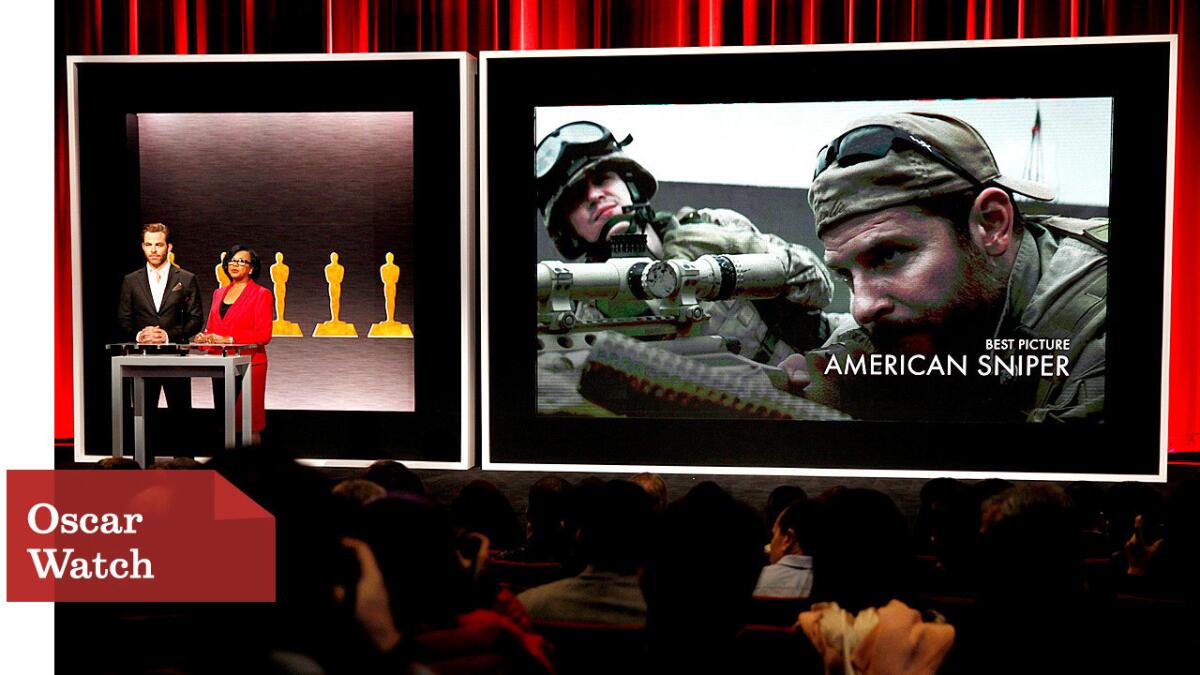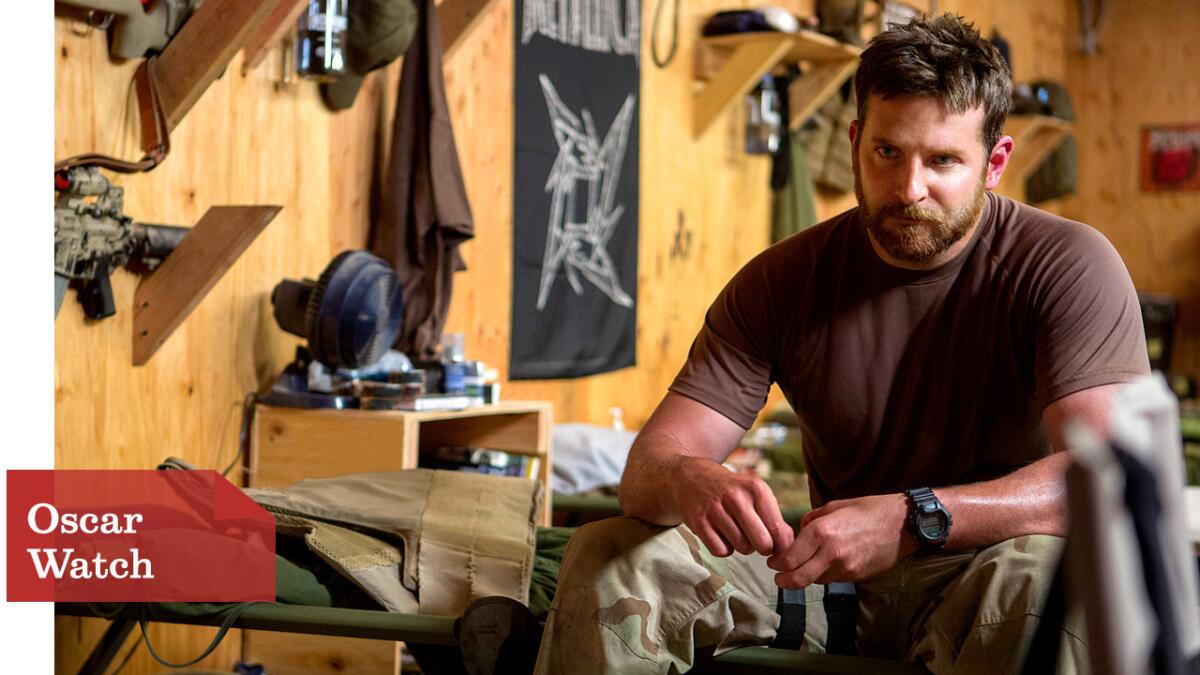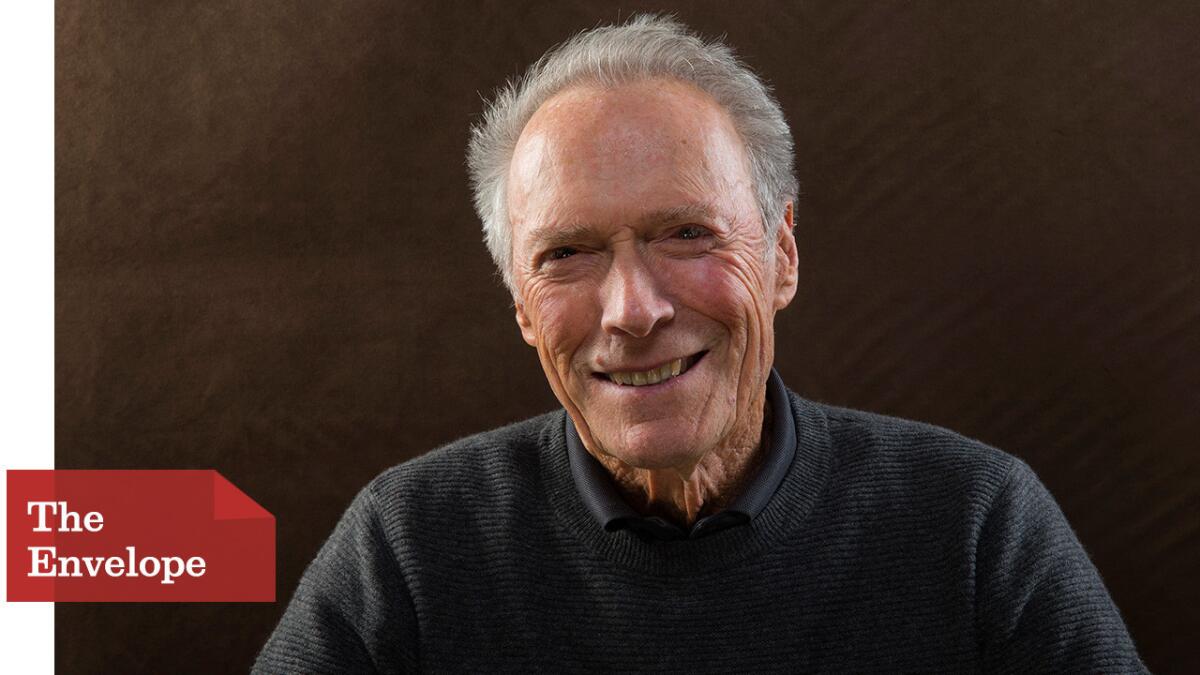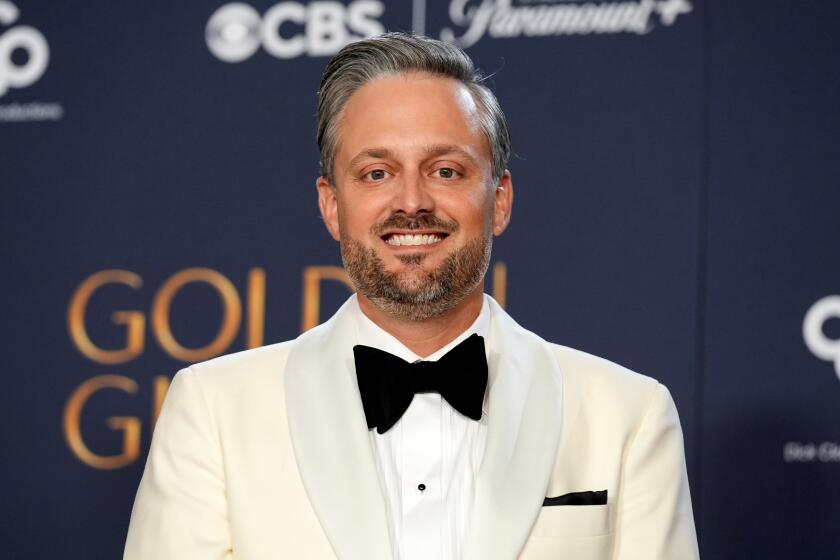Gold Standard: Oscar Watch: ‘American Sniper’ zeroes in on best picture

- Share via
Oscar Watch, charting the ups and downs of the award season, comes to you every Monday. In the wake of "American Sniper's" record-breaking box office success, we'll zero in on that movie's chances in the best picture race.

"American Sniper"
Clint Eastwood gets it: People think they know him from a lifetime of making movies and living in the public eye.
"Whatever people want to think, that’s what they draw in," Eastwood told me recently, sitting in his office in the corner bungalow at Warner Bros., where he has worked for the last 40 years. "I’ve been on the left and on the right in my lifetime. Now I don’t know where I am."
But based on the reaction to Eastwood's phenomenally successful new film, "American Sniper," a lot of people think they know exactly where Eastwood stands. And some of them haven't even watched the movie, reviewing instead the two-minute trailer or the book written by Chris Kyle, the Navy SEAL who, during four tours of duty in Iraq, became the most lethal sniper in American military history.
One problem: The man in the book seems less troubled by the notion of killing than the character we see Bradley Cooper playing in the movie. And some audience members are having a difficult time separating the two, completely missing the message of Eastwood's movie in the process.
Oscars 2015: List | Top nominees | Reactions | Snubs/surprises | Live updates | Full coverage
Will that issue hurt "American Sniper's" chances at winning the best picture Oscar next month? Possibly, though the movie's December premiere might be more of a factor as late-in-the-year breakers like "Sniper" have a hard time building momentum in the award season marathon.
But the movie's politics might be less of an issue, consistent as they are with how Eastwood has looked at war ("Flags of Our Fathers," "Letters From Iwo Jima," "Heartbreak Ridge") and the price that killing exacts on one's soul and psyche (the Oscar-winning "Unforgiven") over the years.
"American Sniper" disdains war but honors the people called to serve and fight. And that's precisely the kind of political statement that academy members can endorse. Jane Fonda already has, taking to Twitter to write, "Powerful. Another view of 'Coming Home.' Bradley Cooper sensational. Bravo Clint Eastwood."
The Chris Kyle in "Sniper" is a courageous patriot, a man of action, not of words, a professional killer who, by necessity of his job, represses his emotions and doubts. The price we see Kyle pay for this control is substantial. Away from the chaos of combat, Kyle is rattled and unmoored. He never doubts the necessity of his actions, but he is haunted by those deeds and those comrades he could not save.

Eastwood's view of the Iraq War itself — a conflict he publicly questioned at a Q&A following the academy screening of "American Sniper" in December — can be found when, at the funeral of Navy SEAL Marc Lee, Lee's mother reads a letter her son wrote two weeks before his death. The key line: "My question is when does glory fade away and become a wrongful crusade or an unjustified means ... which consumes one completely?" The scene, and the mother's words (in voice-over), begins with a shot of Kyle on a plane sitting next to the flag-draped coffins of his comrades.
"People were crying when that mother spoke," says one Oscar voter who was at the December academy screening. "That's when I knew this movie was going to connect in a big way."
Those attacking "Sniper" must have missed that scene. (Note to Dennis Jett and Lindy West: It wasn't in the trailer.) Context has also been an issue with some critics. "Selma," Ava DuVernay's civil rights drama, caught heat for misrepresenting its context; "Sniper's" critics lament that the movie doesn't have any context at all. Eastwood, they charge, doesn't address the politics behind America's invasion of Iraq or the effects that action had on that country.
Oscars 2015: List | Top nominees | Reactions | Snubs/surprises | Live updates | Full coverage
"The film's just a repetition of context-free combat missions and one-dimensional targets," Entertainment Weekly critic Chris Nashawaty writes.
If that's all you took from "American Sniper," I'd argue you weren't paying attention. But then, it's often that way with Eastwood's films. "I don't like to preach," he told me. "I like to bury stuff in my movies, putting messages in them, yes, but with subtlety." He pauses and smiles. "Or maybe without that much subtlety. I'll let others be the judge of that."
Audiences have spoken to the tune of $105.3 million over the last four days. Whether academy members will match that approval stands to be seen. One certainty: The best picture race is more interesting than it was when nominations were announced Thursday morning.
Twitter: @glennwhipp
From the Oscars to the Emmys.
Get the Envelope newsletter for exclusive awards season coverage, behind-the-scenes stories from the Envelope podcast and columnist Glenn Whipp’s must-read analysis.
You may occasionally receive promotional content from the Los Angeles Times.





